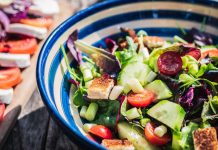For some people, being vegan is part of their lifestyle, but others cannot conceive of missing out on dairy products, meat or eggs. This could be explained by several myths that revolve around these diets.
“Vegan diets are low in protein”
The daily protein requirement can be procured from other sources, not only from meat products. Dr Eric Sharer of the Academy of Nutrition and Diet recommends several valuable sources of protein, such as lentils, seeds, beans, nuts or almonds, writes Health. Other essential foods to ensure your protein intake are quinoa, tofu, soy milk, rice or peas.
“Vegan diets are not satiating”
This can only happen if you don’t eat enough fibre, protein and fat, says Dr Drew Ramsey of Columbia University. When you feel hungry, you have several plant-based alternatives to control your appetite: from meat-free soups to fruit smoothies and nut milk or salads that contain high protein components.
“Vegans have less energy”
Vitamin B12 and iron are two essential elements to ensure your energy level and, indeed, they are mainly found in meat products, milk and eggs. However, they can also be found in fruits and vegetables. For example, you can get iron from apricots, peaches, leafy greens or whole grains. Other sources of energy are fruits (for example, apples or citrus fruits), almonds, sweet potatoes, brown rice, honey and nuts.
“Vegan diets are not recommended during pregnancy or breastfeeding”
Experts at the University of Rochester Medical Centre say that vegetarian diets can provide the nutritional needs of pregnant women or nursing mothers. However, they point out that in these cases, the food consumed should be chosen with great care, together with a specialist. Dr Reed Mangels, of the Vegetarian Resource Group, advises expectant mothers to include products such as dried fruit, soy, or nuts in their daily diet, writes Health.
On the other hand, experts at the University of Rochester point out that vegan diets are not always healthy. For example, although potatoes are part of such a vegan diet, frying them in oil is an unhealthy practice.
Moreover, they emphasise the importance of ensuring optimal levels of vitamin B12 and calcium for vegans. Last but not least, although the adoption of a vegan diet helps to reduce the risk of developing cardiovascular disease, the genetic factors that influence the development of heart problems and the increase in cholesterol must also be taken into account.
Alina Kartman majored in Communications and Public Relations, but opted for a career in journalism. Having published more than 1,500 pieces of writing over her 13 years of media activity, Alina has senior editorial experience. She is part of the team who advanced semneletimpului.ro, the platform for the Signs of the Times magazine in Romania. She is currently pursuing a Master’s degree in Programs and Investment Management.



















